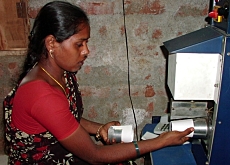Credit offers India’s poor “clean” start

Microfinance schemes in India are helping poor women with an entrepreneurial spirit to help themselves.
swissinfo visited two women’s groups in Andhra Pradesh. One has claimed success with its own line of paper cups, while the other has made a clean start with washing powder.
We are accompanied on the four-hour drive from Hyderabad to Khammam district by Jayaram and Subhasini, managers of the National Bank for Agriculture and Rural Development (Nabard) at its Hyderabad headquarters.
Nabard is supported by the Swiss Agency for Development and Cooperation (SDC). Their “partnership in rural finance”, which dates back more than 20 years, is designed to open up access to financial services to the rural poor, especially women (see related story).
Nabard champions self-help groups (SHGs) such as the ones we are on our way to visit.
We eventually find ourselves in a Khammam village, and park outside the entrance to a one-storey brick building. A row of women dressed in smart saris and carrying blooms are waiting to receive us beneath a colourful banner.
Once inside, they take up position by small machines and start churning out paper cups. The cups fill the shelves lining the walls, neatly stacked in four sizes.
One lady takes an oblong-shaped piece of paper and shapes it around a cylinder, another then takes the form, adds a circle-shaped bottom and pulls a lever, joining the two together. A third person bangs the bottom with a huge hammer.
The workers make nearly 5,000 cups a day, last year earning the company a profit of 52,000 rupees ($1,187). Each woman draws a salary of 600 rupees a month with the profits shared equally among them.
Overflowing
Their cups are found in cinema halls and railway stations and orders could soon be overflowing – the group recently won a contract from the Indian Tourist Board.
The business was the brainchild of one of the women in the group, Uma. The idea came to her after seeing a television programme about how paper cups were more environmentally friendly than plastic ones.
After discussing the idea with people from her village, she found she was eligible for training as part of a government initiative promoting livelihoods in rural areas.
She joined forces with members from six other self-help groups and a government agency gave them a start-up grant of 290,000 rupees, which was topped up with a 80,000 rupee loan by the Nagarjuna Grameena Bank (NGB).
Nabard plays a key role by linking SHGs like the paper cup initiative to banks, under what is known as the SHG-Bank Linkage Programme.
A typical SHG is made up of 15-20 people, usually women, who come together to save.
Once a SHG’s common kitty reaches a certain size and the group has existed for at least six months, the group can approach a bank for a loan. This introduces members to institutional banking.
The idea is that the group itself is the collateral, which can be offered to banks when seeking a loan. The group decides which members should benefit first from a loan depending on need and peer pressure ensures that the dues are paid back.
If the beneficiary defaults, the group dips into the common pot and repays the bank, while coming to an internal arrangement with the defaulter.
More than 1.6 million SHGs have accessed credit through this programme, through nearly 560 banks, with more than 3,000 non-governmental organisations involved.
Whiter than white
Vimala and Jayamma, who belong to another SHG, are helping village housewives get their whites whiter than white by manufacturing washing powder in their own homes.
They were inspired to do so after hearing a government agency say that making the detergent was easy.
They and seven other women mix a number of raw materials, which are then sieved and left to dry in the sun. The ingredients include liquid acid, whitening agent and blue dye.
The resulting brand of washing powder is “Kinnera”, named after a local dam and packaged in small white plastic bags.
The women say their customers, who, like them, are village housewives, are fond of the quality of their product.
Unfortunately its unit price is 10 rupees higher than a commercially manufactured rival, so the group is contemplating whether to decrease quality to bring down production costs.
The SHG has so far borrowed 200,000 rupees from NGB, of which half has been paid back. About 50,000 rupees were sunk into the detergent business, while the rest was spent on setting up a dairy and clothes-selling business.
Profit margins on the milk products have been higher than those from the washing powder.
Reliable borrowers
Both Uma and Vimala’s groups have proved reliable in making repayments to NGB, which is true for the majority of SHGs across India.
“The repayment rate is more than 88 per cent, with peer pressure playing an important role in ensuring that people pay the money back,” Subhasini says.
The NGB interest rate is typically 0.5 per cent more than commercial banks, which charge between six and eight per cent.
Jayaram says the micro-financing schemes have not put the traditional moneylender out of business, but have forced him to adapt.
“He has had to reduce his rates [up to 600 per cent interest] but his business is assured as 30 per cent of people seeking money still rely on his services,” Jayaram explains.
swissinfo, Faryal Mirza in Khammam, India
Microfinance refers to loans, savings, insurance, transfer services and other financial products for low-income clients.
Microcredit is a small amount of money loaned to a client by an institution often without collateral.
There are some 500 million borrowers worldwide.
Microenterprises make up 80% of all businesses in developing nations.
The Indian government set up Nabard in 1982 with the mission of promoting sustainable and equitable agriculture and rural prosperity.
It refinances the investment credit activities of its client banks, which include commercial, cooperative and regional rural banks.
Since its inception until the end of March 2005, it had disbursed refinance to the sum of 8.2 billion rupees.

In compliance with the JTI standards
More: SWI swissinfo.ch certified by the Journalism Trust Initiative

You can find an overview of ongoing debates with our journalists here. Please join us!
If you want to start a conversation about a topic raised in this article or want to report factual errors, email us at english@swissinfo.ch.